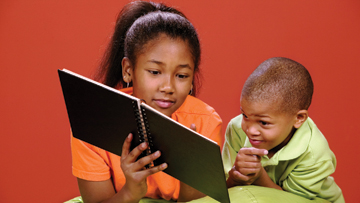You have free articles remaining this month.
Subscribe to the RP Witness for full access to new articles and the complete archives.
For $454 you can help a class of elementary students in North Carolina improve their spelling. In an impoverished area of Chicago, a $406 gift will help a teacher give her hyperactive students some classical music CDs and big floor pillows for reading breaks.
That’s the kind of charitable giving that former New York City teacher Charles Best wants to encourage. He has established a web site, Donorschoose. org, to let people bypass the traditional bureaucracies and support public schools through very specific projects initiated by teachers. The projects tend to be small enough for donors to feel they can make a difference without having to give a lot of money. The average cost is $500. Yet the impact of the gift is quite tangible. Public school students, often from single- parent families, will likely be reading more books, listening to good music, taking some field trips, and working on hands-on media projects.
Best started the web site as a teacher in a low-income Bronx school in 2000. He got tired of paying for special projects from his own pocket and wondered if donors might respond to specific appeals in contrast to the more common political plea for multi-million-dollar remedies for public education.
The answer for Donorschoose has been a big yes. Expanding to a few other states beyond New York City in the past couple of years, the web site has raised $10 million for projects, generally in lowincome school districts.
At the Dodge Renaissance Academy in Chicago, a teacher wrote about fidgety children from poverty-stricken homes. “Every teacher in the world faces it: kids fidgeting at their seats, playing with things in their desks, shooting rubber bands, not being able to stay in their seats.” She came up with some alternatives, such as beanbag pillows for reading and listening to classical music. “Studies show that classical music in the classroom can help soothe the room while students are working independently,” she wrote in her appeal. Now, for $406, she is asking for more “fidget-controlling comfort supplies,” including the classical music CDs.
In Wake County, N.C., an English teacher is asking for $2,014 for 30 copies of The Bible and Its Influence, from the Bible Literacy Project. His reasoning is that basic knowledge of the Bible is essential to understanding classical literature. “The children are arriving knowing less and less about this once-shared cultural knowledge,” he notes.
Donorschoose was born in a politically blue city—New York. Founder Charles Best was born there too, in Manhattan, and went to Yale before he started teaching. The success of his project reflects his own humble willingness to give the spotlight to others, especially teachers. He’s gotten corporate sponsors to pay for the small staff of 15, who screen proposals and get supplies to a teacher once a project is funded.
Though from New York, he sees how his idea has appeal in red or blue states, conservative or liberal, for different reasons.
“We have plenty of NPR radio listeners who go to our website to help poor kids, to help level the playing field,” he says. “They may feel that the government ought to be doing more for urban poor public schools.”
But in red states such as Indiana, Texas, and North and South Carolina, Best finds that conservative donors are just as interested in the initiative. “For a conservative or libertarian this is a way to circumvent the school bureaucracy and choose where the money is going,” he notes. “That’s fundamentally a red-state approach.”
The web site also bears a slight resemblance to an idea once promoted by then U.S. Reps. Mike Pence and Mark Souder as an alternative to big government. They proposed that taxpayers be allowed to choose a charity for a certain amount of their federal income tax responsibility, bypassing the government bureaucracy and sending the money directly to a local rescue mission to help the homeless. Their proposal never made it into the federal tax code, but variations of it have been adopted through tax credits in some states.
Donorschoose may be tapping into the old politically nonpartisan public school ethic. For many people it’s only a memory, but the ethic assumed that public schools reflect civic duty and ought to be run by an informal partnership of parents, civic leaders, and professional educators. It was never a perfect marriage between these groups. A number of Reformed Presbyterians have given their lives to this cause, as parents of students, school board members, and teachers. In a very healthy way they acted as salt and light in the schools in a period of time when the school system was part of a broad social consensus in favor of biblical values.
That public school ethic was shattered from the 1960s to 1980s, creating an educational crisis, especially in urban school systems. Blame can be cast about for the shattering of an important civic consensus about public schools—on teachers unions or the breakdown of the family or court rulings against the Bible in schools.
Instead of blaming anyone, though, Donorschoose may be pointing to an interesting choice-oriented way to recover some of that lost sense of civic responsibility.
